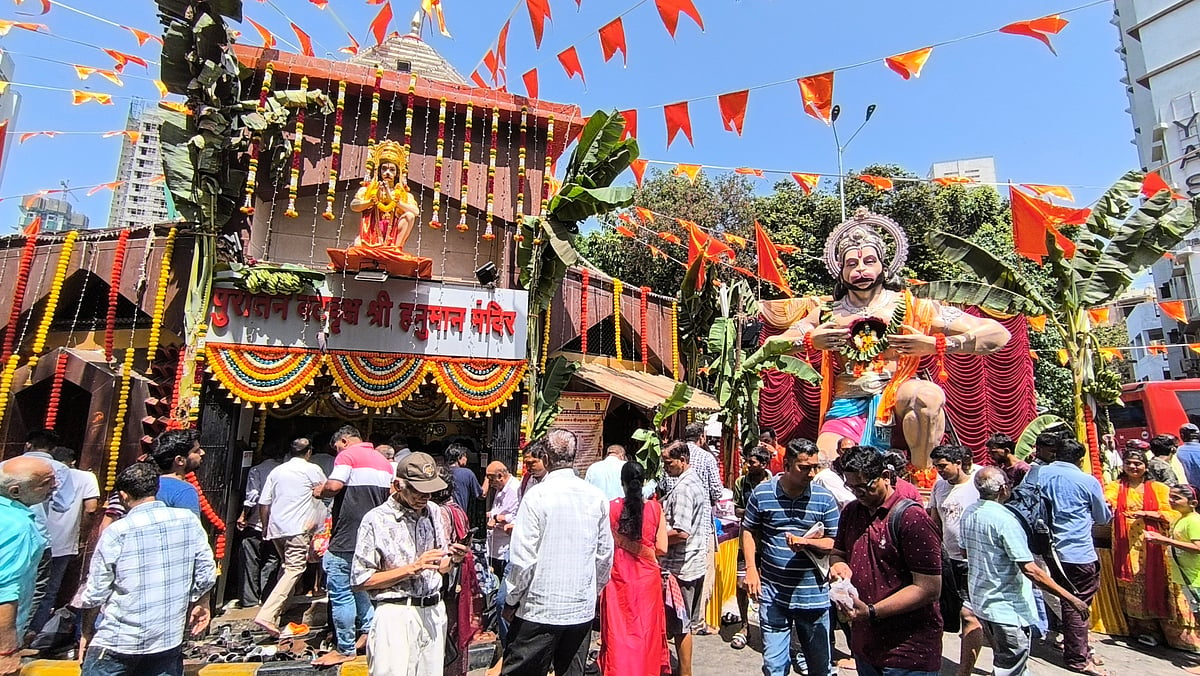Mumbai Gears Up For Vibrant Baisakhi, Vishu, Bihu And Poila Baisakh Celebrations Across Communities; See Pics
On April 13, Punjabis will celebrate Baisakhi, the first day of the month of Baisakh, also known as Vaisakh. For Sikhs, the day has additional importance as it is the anniversary of the establishment of 'Khalsa Panth' in 1699 by Guru Gobind Singh, the tenth Sikh guru, as an ideal for morality, conduct, and bravery. Devotees celebrate it with nagar kirtans, community service, and collective prayer.
Bal Malkit Singh, executive chairman of Maharashtra State Punjabi Sahitya Academy, said, "Khalsa Sajna Diwas and the birth anniversary of Guru Tegh Bahadur Sahib Ji are not just moments of remembrance they are beacons of inspiration for humanity. Guru Tegh Bahadur Ji’s supreme sacrifice for religious freedom and Guru Gobind Singh Ji’s formation of the Khalsa stand as eternal pillars of justice, bravery, and faith.”
 Devotees gathered to offer prayers at Hanuman Temple at Dadar on the occasion of Hanuman Jayanti in Mumbai.
Devotees gathered to offer prayers at Hanuman Temple at Dadar on the occasion of Hanuman Jayanti in Mumbai.
 Devotees gathered to offer prayers at Hanuman Temple at Dadar on the occasion of Hanuman Jayanti in Mumbai.
Devotees gathered to offer prayers at Hanuman Temple at Dadar on the occasion of Hanuman Jayanti in Mumbai.
Assamese speakers will celebrate Bohag Bihu from the evening of April 14. The festival is also called Rongali Bihu because it is a time for music and dance. Bohag is the Assamese word for Baisakh. The festival is the biggest of the three Bihus in the year. Aparup Borpuzari from Kharghar said that the celebrations go on for a long time in the villages. "It can be celebrated during the entire month. Cattle are taken to the river, where they are bathed and fed. The Bihu dance features men and women who follow the rhythms of the Assamese dhol. In cities, the celebrations are limited," said Borpuzari. In Mumbai, the community will hold celebrations in Bandra, Kharghar, and Panvel.
It will be Poila Baisakh, the first day of the New Year, for Bengalis on April 15. Tapan Bannerjee, secretary of the Thakur Village Bengali Association, Kandivali (East), said the festival celebrates the year's first harvest. "Because the festival is associated with the first crop of the year, the day is celebrated with special Bengali dishes," said Bannerjee. The Thakur Village Bengali community has organised an evening of Rabindra Sangeet, drama, and music at a local hall.
 Mumbai Gears Up For Vibrant Baisakhi, Vishu, Bihu And Poila Baisakh Celebrations Across Communities
Mumbai Gears Up For Vibrant Baisakhi, Vishu, Bihu And Poila Baisakh Celebrations Across CommunitiesMalayalis will celebrate Vishu on April 14. On the same day, Tamils will celebrate Puthandu, which means New Year. Vishu is also the spring harvest festival of Kerala that falls on the first day of the Malayalam month of Medam. Malayalis worship Lord Krishna and pray for good health and prosperity. People set up Vishukkani, an arrangement of auspicious items, at home and in temples, said K A Vishwanathan from Matunga. On this day, elders give money to youngsters, a tradition known as Vishu Kaineetam.
Malayalis from all over Mumbai will queue up at Matunga's Asthika Samaj temple from early morning, wearing new dresses to have darshan of Lord Krishna, or Guruvayoorappan, and the Vishukani, an arrangement of fruits, grains, currency, and coins kept in front of a huge mirror.
Another temple in Matunga, Sri Sankara Matham, also keeps Vishukani and gives a token coin to all those who visit the temple. It is believed that on this day, Lord Krishna killed the demon Narakasura, and hence Vishu is celebrated to commemorate the victory.
One of the most important features of Vishu is Sadhya, a feast where the entire family comes together to celebrate. For those who want a taste of Vishu Sadhya, Chembur' iconic Mani’s lunch home prepares Sadhya with more than 15 dishes including Koottu Curry, Mambazha Pachadi, Avial, Olan, Sambar, Rasam along with sweet kheer called Palada Pradhaman and Chakka pradhaman made out of jack fruits and Kerala banana, pappadam and chips, said S Rajamani of Mani’s. Last year nearly 600 people queued up for the Sadhya.
news